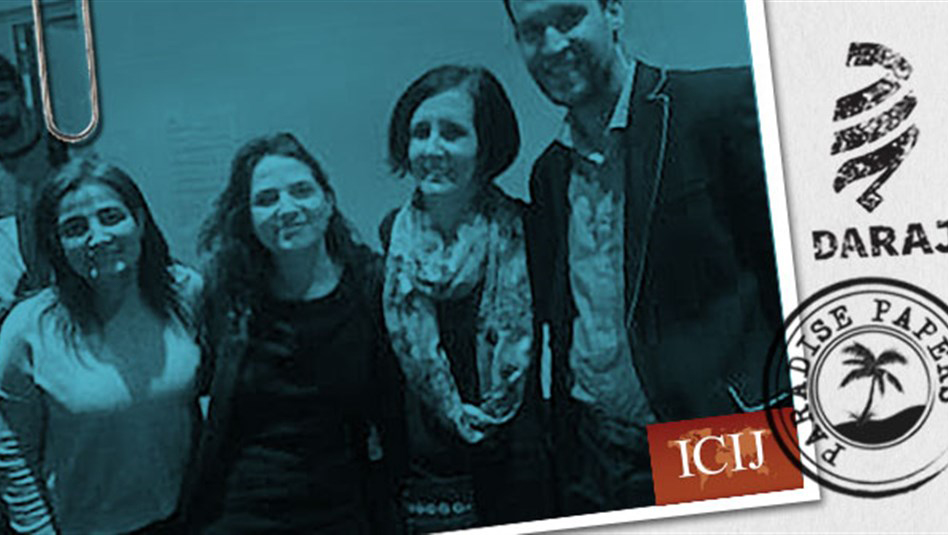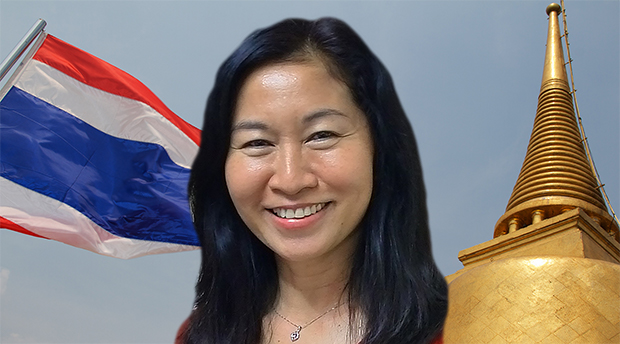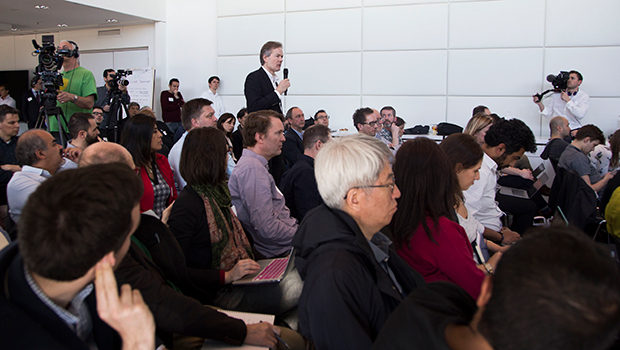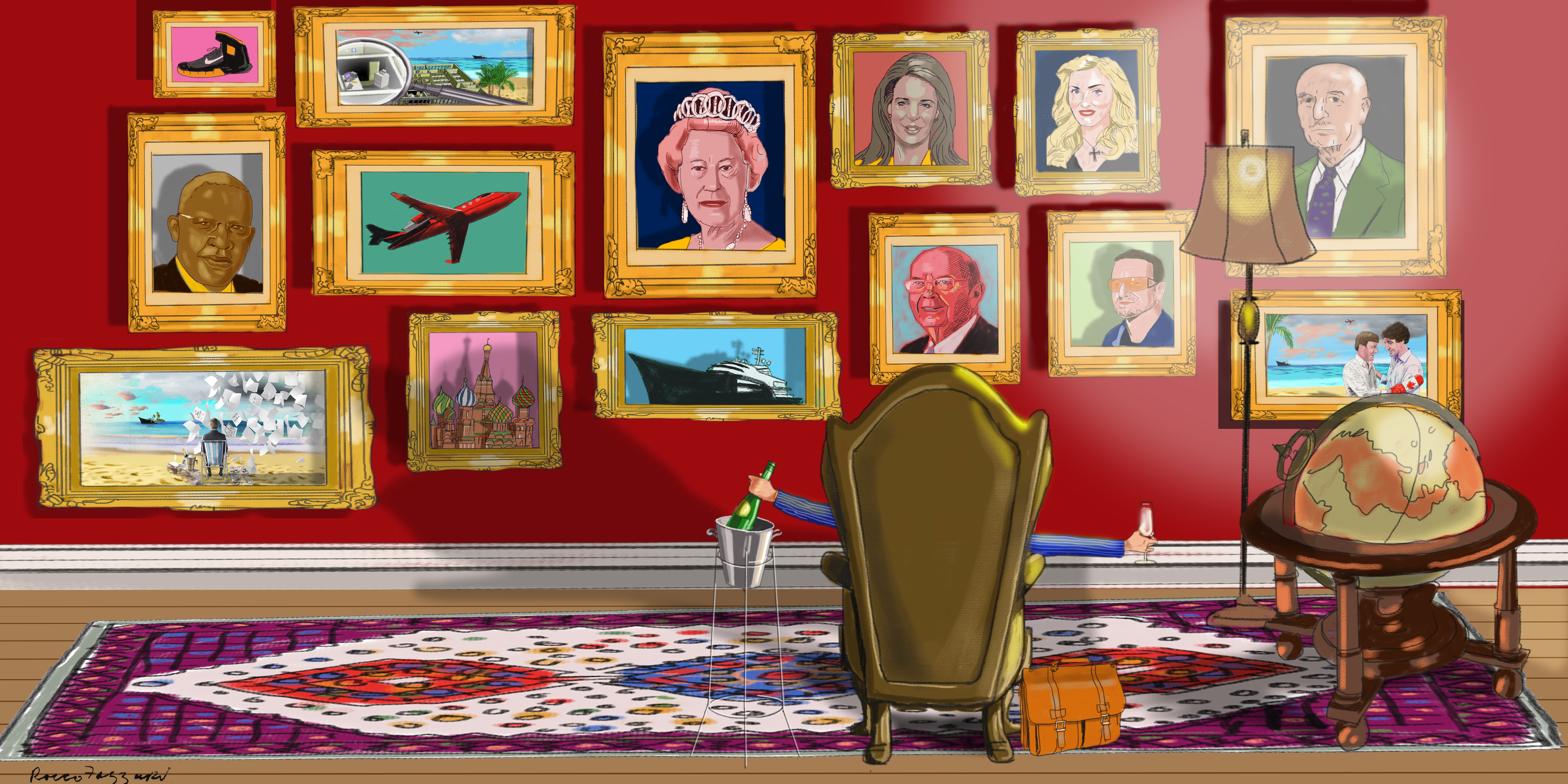Alia Ibrahim is a co-founder of the news website Daraj. She worked on ICIJ’s most recent investigation, Paradise Papers, and here reflects on what it was like to collaborate across the world.
It was a pleasant evening in late March of 2016. We were a group of journalists in a suburban Munich restaurant located not too far from the headquarters of the newspaper Süddeutsche Zeitung.
Around the dining table, Marina Walker sat next to me and told me how confident she was that the Paradise Papers investigation was going to be an “amazing story we are going to tell to the world in just a few months.”
The deputy director of the International Consortium of Investigative Journalists (ICIJ) paused for just a moment. And then, in a whisper, as if talking to herself, she continued.
“The full story, is the one that will be told 50 years from now… then, if we succeed, we will tell our grandchildren how we started.”
From the first moment I approached her with the plans my team and I had for our news site Daraj, Walker didn’t hide her enthusiasm for the idea of an independent Arab media company that would contribute to the project and then publish its stories.
Just like her colleagues, Gerard Ryle, ICIJ’s director, and Will Fitzgibbon, the team member responsible for Middle East and Africa stories, Marina showed a great deal of trust and support, including giving our team the right to introduce ourselves as partners in future projects of the consortium, now recognized as a pioneer in investigative collaborations and winner of the Pulitzer Prize for the Panama Papers.
To us, this was huge.
Daraj at that stage was still just an idea.
It was a project consuming our energy, time, imagination and talent and an objective our team members were passionately pursuing for many reasons – most importantly because it gave us the drive we needed to keep trying and believing that we could still achieve something, despite multiple failures since the Arab Spring was derailed.
Daraj was filling our hearts and minds, but it was, nonetheless, just an idea, ink on paper, looking for the support and funding to be able to exist.

The trust that ICIJ showed our team and our project gave us a massive moral push, but the challenges were huge.
What we had in mind was simply crazy.
Daraj had a name, a logo and a slogan – “The Third Story” – but design and development hadn’t started yet, and the possibility of us being ready to publish by the initial deadline in June (2017) was simply impossible.
Deciphering the Paradise Papers riddles
During the weeks that preceded the Munich meeting, our core team of four journalists had spent hours working on the data we had been given full access to. Our pledge to protect the secrecy of the documents meant that we couldn’t get any expert help to assist us in deciphering the riddles we were looking at.
It was obvious that we were on the right track. But it was also clear that the success in the mission required the full attention and commitment of those working on it. That was a luxury none of our team members could afford.

The absence of any other Arabic-language outlet on the project and what that would mean in terms of exclusivity and exposure for Daraj when publishing time came, were behind our strategic decision to prioritize work on Athena, even if that meant compromising other important standards including design.
Still, June was just a few months away, and it was sheer craziness to think that we could meet that deadline.
When I mentioned my fears to Walker, she answered with her usual calm smile that all we had to do is to actually vote in favor of postponing the publication date.
My partner Diana Moukalled and myself laughed at the idea, that Daraj could actually have a voice even before it existed.
But that was exactly what happened.
The next morning, in the conference room that the German newspaper had arranged for the secret meetings that lasted for two days, the vote was held.
Representatives of the world’s leading media organizations, including the BBC, the Guardian, Le Monde and Radio Canada, wanted to proceed with publication in June. They had very strong arguments. Most of them had come a long way in their reporting, and their stories were almost completed.
But that wasn’t all.
The New York Time’s team, for example, had serious concerns that an impeachment attempt against President Donald Trump was possible and that, if it happened, this would practically kill the value of their lead story about the relations of his administration with individuals close to Russian President Vladimir Putin.
But the majority of the smaller organizations wanted to postpone. The voting process lasted about 30 minutes; the small organizations won, and the date of November 5 was agreed on.
Another obstacle we had to overcome was the challenge of finding relevance to our audience in project.
In the room that all the partners willingly locked ourselves in for two days, I listened to our colleagues talk about the “tremendous” violations that were uncovered.
The court of public opinion
The papers didn’t uncover as much as they confirmed and provided legal documentations for actions that might be legal in many cases. But presenting the information to the court of public opinion is a necessary step in the process of reforming laws that allowed the extremely rich to multiply their fortunes at the expense of the tax-paying and struggling classes.
There were stories about the queen of England and the Trump administration, leading multinational corporations, music rights and cinema and sports stars. Even religious and educational organizations were using offshore havens.
It was the whole world system under scrutiny.
Some of the stories mentioned were amusing despite the uncertainty of the answers, like the moment when Walker was asked if the Soros Foundation, one of her organization’s main funding sources, would be mentioned, which she answered with a confident, yes, and a sure smile.
Our colleagues in that room knew well that it wasn’t simply discomfort but legal repercussions that might follow their stories based on information contained in the documents. [Editor’s note: Our partners in the UK still face legal action from offshore firm Appleby.]
They genuinely felt empowered by the anticipation of the publication of information.
That was exactly my thought when I received a piece of news from Beirut.
The #familyrepublic that had gone viral on Twitter in the preceding weeks commenting on the growing number of appointments of the president’s family members to public offices and key positions – including that of of a family member as the army commander – was trending again after the president’s friend Elias Abou Saab was named as his adviser on foreign affairs.
It was business as usual in Lebanon. That was just another day. These are our stories. And the stories coming from all over the region were in no way better. So, what on earth were we doing in this room?
The power of working together
Some of the answer, I found in that room, on that day.
Next to the big stars, there were others like us.
One reporter told us she found the name of her publisher in the documents and that she was proceeding with the investigation even if she had no idea what could happen when the time to face him arrived.
Our colleague from Turkey told us that among the names she found were members of Prime Minister Binali Yildirim’s family and that she had serious doubts she would be able to publish in light of the growing oppression of journalists in her country.
Things were even more dangerous for others.
Our ICIJ colleague Matthew is safe and sound, but his mother Daphne Caruana Galizia, a Maltese investigative journalist renowned in her country, was following up on her own on the Panama papers stories and was killed in a car bomb just days before publication of the Paradise Papers.
The colleague from Japan was struggling for other reasons. Finding an angle to her story was difficult. She couldn’t find any Japanese names in the documents. “It seems there is no tax evasion in Japan,” she said miserably.
What was the story we were going to tell our audience?
On that day, I didn’t find an answer, but my conviction that we should participate in the project included no doubts.
Stars of investigative journalism were standing together in the service of the same story.
Everybody was convinced there was no room for an individual scoop at the expense of the project.
The idea itself sounded crazy, but the picture was clear.

Most of the effort that everyone in that room put above all was self-defense and defense of our profession. When Donald Trump blew the smoke bomb of fake news, he didn’t target American journalists exclusively, but every journalist, anywhere in the world.
Over the two days I spent in Munich, I realized not only how interconnected our stories were but also how much we could do when we work together.
Our readers – the readers we imagined for Daraj – are part of this world, and much of the conversation happening across the globe is actually about them.
This was an opportunity to actually take part in the conversation, instead of just being on its margins, or worse, being merely its subject.
Never a ‘good time’ in the Middle East
Five days separated the launch of Daraj from the simultaneous global publication of the Paradise papers on November 5, at 8:00 p.m. Beirut time.
“Good luck,” said a phone message from Will Fitzgibbon just a few minutes before the publication.
“We have a resigned PM (prime minister) and in Saudi 11 arrested billionaire princes, we’re going to need a lot of luck,” I answered, mentioning the region’s ongoing chaos unrelated to the Paradise Papers.
Will laughed and reminded me that my partner Diana had predicted that in the Munich meeting when she said there will never be a good timing for the Middle East. Indeed, the timing in this part of the world is not going to be convenient for any projects, any time soon.
But who knows, maybe in 50 years, we will be able to tell a different story.
Maybe in 50 years, we will tell our grandchildren, that it was then, and for those reasons that we decided to start, when nothing seemed possible.
This article was first published on Daraj.



